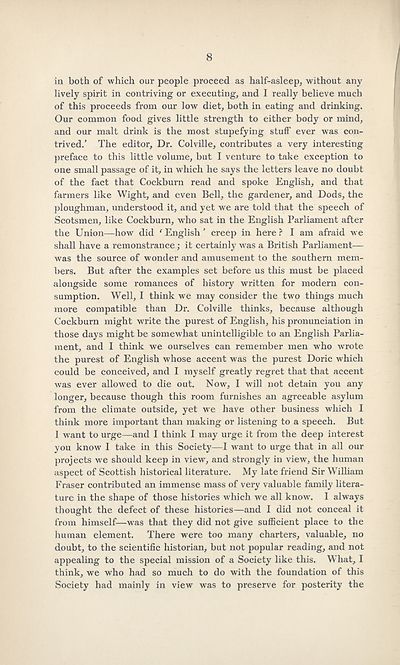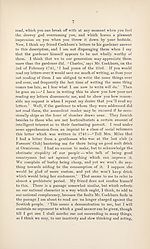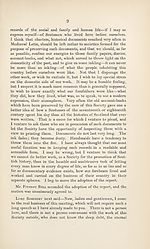Download files
Complete book:
Individual page:
Thumbnail gallery: Grid view | List view

8
in both of which our people proceed as half-asleep, without any
lively spirit in contriving or executing, and I really believe much
of this proceeds from our low diet, both in eating and drinking.
Our common food gives little strength to either body or mind,
and our malt drink is the most stupefying stuff ever was con¬
trived.’ The editor. Dr. Colville, contributes a very interesting
preface to this little volume, but I venture to take exception to
one small passage of it, in which he says the letters leave no doubt
of the fact that Cockburn read and spoke English, and that
farmers like Wight, and even Bell, the gardener, and Dods, the
ploughman, understood it, and yet we are told that the speech of
Scotsmen, like Cockburn, who sat in the English Parliament after
the Union—how did ( English ’ creep in here ? I am afraid we
shall have a remonstrance; it certainly was a British Parliament—
was the source of wonder and amusement to the southern mem¬
bers. But after the examples set before us this must be placed
alongside some romances of history written for modern con¬
sumption. Well, I think we may consider the two things much
more compatible than Dr. Colville thinks, because although
Cockburn might write the purest of English, his pronunciation in
those days might be somewhat unintelligible to an English Parlia¬
ment, and I think we ourselves can remember men who wrote
the purest of English whose accent was the purest Doric which
could be conceived, and I myself greatly regret that that accent
was ever allowed to die out. Now, I will not detain you any
longer, because though this room furnishes an agreeable asylum
from the climate outside, yet we have other business which I
think more important than making or listening to a speech. But
1 want to urge—and I think I may urge it from the deep interest
you know I take in this Society—I want to urge that in all our
projects we should keep in view, and strongly in view, the human
aspect of Scottish historical literature. My late friend Sir William
Fraser contributed an immense mass of very valuable family litera¬
ture in the shape of those histories which we all know. I always
thought the defect of these histories—and I did not conceal it
from himself—was that they did not give sufficient place to the
human element. There were too many charters, valuable, no
doubt, to the scientific historian, but not popular reading, and not
appealing to the special mission of a Society like this. What, I
think, we who had so much to do with the foundation of this
Society had mainly in view was to preserve for posterity the
in both of which our people proceed as half-asleep, without any
lively spirit in contriving or executing, and I really believe much
of this proceeds from our low diet, both in eating and drinking.
Our common food gives little strength to either body or mind,
and our malt drink is the most stupefying stuff ever was con¬
trived.’ The editor. Dr. Colville, contributes a very interesting
preface to this little volume, but I venture to take exception to
one small passage of it, in which he says the letters leave no doubt
of the fact that Cockburn read and spoke English, and that
farmers like Wight, and even Bell, the gardener, and Dods, the
ploughman, understood it, and yet we are told that the speech of
Scotsmen, like Cockburn, who sat in the English Parliament after
the Union—how did ( English ’ creep in here ? I am afraid we
shall have a remonstrance; it certainly was a British Parliament—
was the source of wonder and amusement to the southern mem¬
bers. But after the examples set before us this must be placed
alongside some romances of history written for modern con¬
sumption. Well, I think we may consider the two things much
more compatible than Dr. Colville thinks, because although
Cockburn might write the purest of English, his pronunciation in
those days might be somewhat unintelligible to an English Parlia¬
ment, and I think we ourselves can remember men who wrote
the purest of English whose accent was the purest Doric which
could be conceived, and I myself greatly regret that that accent
was ever allowed to die out. Now, I will not detain you any
longer, because though this room furnishes an agreeable asylum
from the climate outside, yet we have other business which I
think more important than making or listening to a speech. But
1 want to urge—and I think I may urge it from the deep interest
you know I take in this Society—I want to urge that in all our
projects we should keep in view, and strongly in view, the human
aspect of Scottish historical literature. My late friend Sir William
Fraser contributed an immense mass of very valuable family litera¬
ture in the shape of those histories which we all know. I always
thought the defect of these histories—and I did not conceal it
from himself—was that they did not give sufficient place to the
human element. There were too many charters, valuable, no
doubt, to the scientific historian, but not popular reading, and not
appealing to the special mission of a Society like this. What, I
think, we who had so much to do with the foundation of this
Society had mainly in view was to preserve for posterity the
Set display mode to:
![]() Universal Viewer |
Universal Viewer | ![]() Mirador |
Large image | Transcription
Mirador |
Large image | Transcription
Images and transcriptions on this page, including medium image downloads, may be used under the Creative Commons Attribution 4.0 International Licence unless otherwise stated. ![]()
| Scottish History Society volumes > Series 1 > Miscellany of the Scottish History Society (Second volume) > (505) Page 8 |
|---|
| Permanent URL | https://digital.nls.uk/126953048 |
|---|
| Attribution and copyright: |
|
|---|
| Description | Over 180 volumes, published by the Scottish History Society, containing original sources on Scotland's history and people. With a wide range of subjects, the books collectively cover all periods from the 12th to 20th centuries, and reflect changing trends in Scottish history. Sources are accompanied by scholarly interpretation, references and bibliographies. Volumes are usually published annually, and more digitised volumes will be added as they become available. |
|---|


